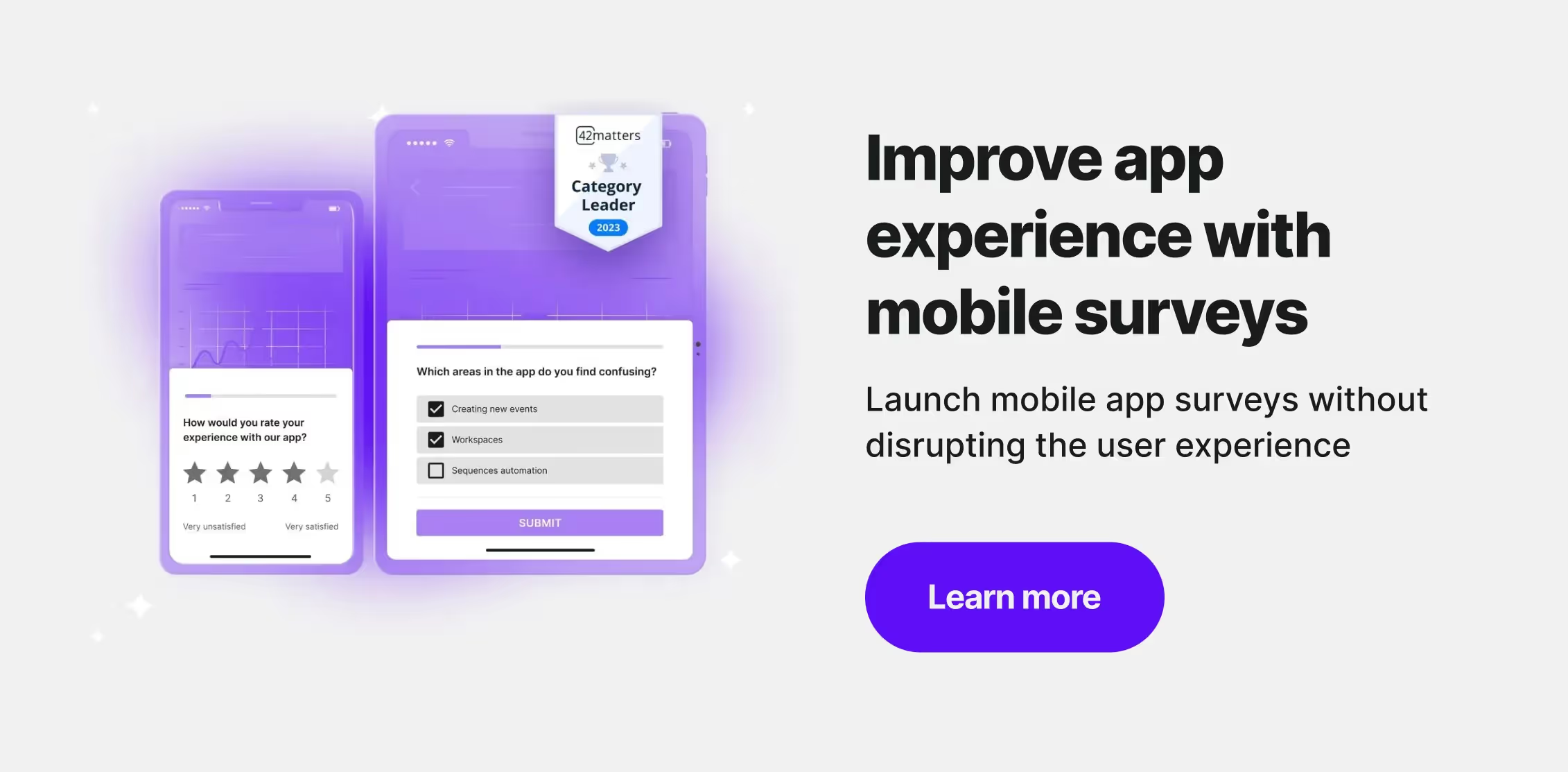In today's fast-paced digital world, mobile apps have become an integral part of our daily lives. Whether we're ordering food, checking the weather, or staying connected with friends and family, mobile apps play a crucial role.
With millions of apps available, users have high expectations when it comes to the user experience. To ensure your mobile app stands out, it's essential to focus on providing the best user experience possible.
Let's explore strategies and techniques to enhance the user experience in your mobile app. We'll discuss the importance of app experience, user experience app design, mobile app user experience surveys, and the use of in-app feedback tools like Survicate surveys to gather valuable insights.

Understanding user experience in mobile apps
User experience (UX) in mobile apps refers to the overall experience a user has while interacting with an application on their smartphone or tablet.
It encompasses everything from
- the app's design
- performance
- ease of use
- overall satisfaction
A positive user experience can lead to increased user retention, higher user engagement, and better app store ratings. On the other hand, a poor user experience can result in frustrated users who are likely to uninstall your app and leave negative reviews.
Why is mobile app user experience important?
Mobile app user experience is vital for several reasons:
- User retention
Users are more likely to continue using an app that offers a smooth and enjoyable experience. A great user experience can keep users coming back for more.
- User engagement
A well-designed app with an intuitive interface encourages users to explore its features, increasing user engagement.
- App store rankings
Positive reviews and high ratings on app stores can significantly boost your app's visibility and credibility.
- Word-of-mouth promotion
Users who have a positive experience with your app are more likely to recommend it to friends and family.
- Competitive advantage
In a crowded app market, delivering an exceptional user experience can set your app apart from the competition.
Now that we understand the importance of mobile app user experience, let's explore some strategies to improve it.
How to improve user experience in your app?
1. User experience app design
The first step in enhancing your app's user experience is to focus on design. A well-thought-out and visually appealing design can make a significant difference.
Here are some design principles to consider:
- Simplicity: Keep the app interface clean and uncluttered. Use a simple and intuitive navigation system to guide users through the app.
- Consistency: Maintain a consistent design throughout the app. Use the same color schemes, fonts, and button styles to create a cohesive look and feel.
- Responsiveness: Ensure that the app functions smoothly on various device sizes and orientations. Responsive design is essential for providing a consistent experience.
- Accessibility: Make your app accessible to all users, including those with disabilities. Consider providing alternative text for images and ensuring proper color contrast.
2. User experience and user feedback
Gathering feedback from your app users is a crucial part of improving their experience. Mobile app user experience surveys are a valuable tool to collect insights directly from your users.
Survicate surveys, in particular, offer a user-friendly solution for this purpose. Here's why Survicate surveys are a great choice:
- No coding required
You don't need to be a coding expert to implement Survicate surveys into your mobile app. The user-friendly interface makes it easy for anyone to set up surveys.
- 10-day free trial
Survicate offers a 10-day free trial with limited features, allowing you to test the platform and see its benefits firsthand.
- Advanced customization
The ability to customize surveys to blend seamlessly with your app's branding is essential. Survicate surveys offer advanced customization options, so your surveys look and feel like an integral part of your app.
- SDK for multiple platforms
Survicate offers SDKs for various platforms, including iOS, Android, React Native, Flutter, and Unity, ensuring compatibility with a wide range of mobile apps.
By using Survicate surveys, you can collect valuable feedback from users, understand their pain points, and make data-driven decisions to enhance your app's user experience.
3. Speed and performance
Mobile users have little patience for slow apps. Speed and performance are critical factors in user satisfaction. To improve the user experience in your mobile app, consider the following:
- Optimize loading times
Reduce loading times by optimizing your app's code and resources. Use asynchronous loading to prevent slowdowns.
- Minimize crashes
Regularly test your app for stability and fix any bugs that may lead to crashes. Users appreciate reliability.
- Offline functionality
Design your app to function in offline mode, or at least provide a clear message when the internet connection is lost.
4. Personalization and customization
Users appreciate a tailored experience.
Implement features that allow users to personalize their app settings, such as theme customization, notification preferences, and content recommendations.
5. Intuitive navigation
A user should be able to navigate your app without confusion. Use intuitive navigation structures, such as a bottom navigation bar or a sidebar menu, to guide users through the app's features.
6. App performance optimization
Optimize your app's performance by reducing memory and battery usage. This can be achieved through efficient coding practices and regular updates to address performance issues.
7. User onboarding
A well-designed onboarding process can help new users get acquainted with your app quickly.
Provide clear and concise instructions to guide them through the initial setup and features.
8. Push notifications
Use mobile push notifications thoughtfully. Avoid overwhelming users with excessive notifications. Allow users to customize their notification preferences to receive only the information that's most relevant to them.
9. A/B testing
Regularly conduct A/B testing to understand which features, designs, or content resonate best with your audience. This data-driven approach can help you make informed decisions for enhancing the user experience.
10. Continuous improvement
User experience is not a one-time effort but an ongoing process. Continuously monitor user feedback, app store reviews, and analytics to identify areas for improvement.
Improve mobile app user experience - surveys
In the world of mobile apps, user experience is paramount. Providing the best app user experience will lead to higher user retention, engagement, and overall success.
Design your app with simplicity, customization, and accessibility in mind. Implement user-friendly feedback tools like Survicate surveys to gather valuable insights, and ensure your app's performance is top-notch.
By following these strategies and keeping the user at the center of your app development process, you can create a mobile app that users love and recommend to others.
Sign up for a free Survicate account today and test business features for 10 days.














.svg)

.svg)


